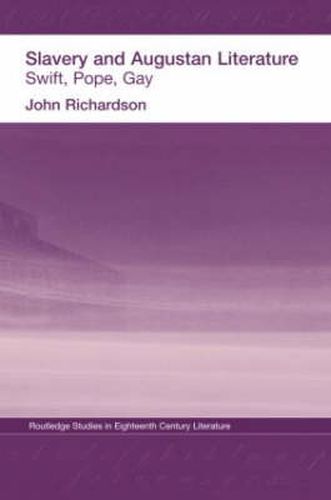Readings Newsletter
Become a Readings Member to make your shopping experience even easier.
Sign in or sign up for free!
You’re not far away from qualifying for FREE standard shipping within Australia
You’ve qualified for FREE standard shipping within Australia
The cart is loading…






Slavery played an important part in early eighteenth-century English society. It created markets, provided goods and drove political decision. It also exerted an influence on the ways in which people behaved and thought. Some of the mental habits associated with slavery are to be found in the writing of the period. Slavery and Augustan Literature investigates slavery in the work of Jonathan Swift, Alexander Pope and John Gay. These three writers were connected with a Tory ministry, which attempted to increase substantially the English share of the international slave trade. They all wrote in support of the treaty that was meant to effect that increase. The book begins with contemporary ideas about slavery, with the Tory ministry years and with texts written during those years. These texts tend to obscure the importance of the slave trade to Tory planning. In its second half, the book analyses the attitudes towards slavery in Pope’s Horatian poems, An Essay on Man, Polly, A Modest Proposal and Gulliver’s Travels. John Richardson shows how, despite differences, Swift, Pope and Gay adopt a mixed position of admiration for freedom alongside implicit support for slavery. Slavery and Augustan Literature provides valuable insights into eighteenth-century attitudes towards slavery, and the relation of literature to society. It also offers new readings of major Augustan texts and will be of essential interest to students and researchers of eighteenth-century literature
$9.00 standard shipping within Australia
FREE standard shipping within Australia for orders over $100.00
Express & International shipping calculated at checkout
Slavery played an important part in early eighteenth-century English society. It created markets, provided goods and drove political decision. It also exerted an influence on the ways in which people behaved and thought. Some of the mental habits associated with slavery are to be found in the writing of the period. Slavery and Augustan Literature investigates slavery in the work of Jonathan Swift, Alexander Pope and John Gay. These three writers were connected with a Tory ministry, which attempted to increase substantially the English share of the international slave trade. They all wrote in support of the treaty that was meant to effect that increase. The book begins with contemporary ideas about slavery, with the Tory ministry years and with texts written during those years. These texts tend to obscure the importance of the slave trade to Tory planning. In its second half, the book analyses the attitudes towards slavery in Pope’s Horatian poems, An Essay on Man, Polly, A Modest Proposal and Gulliver’s Travels. John Richardson shows how, despite differences, Swift, Pope and Gay adopt a mixed position of admiration for freedom alongside implicit support for slavery. Slavery and Augustan Literature provides valuable insights into eighteenth-century attitudes towards slavery, and the relation of literature to society. It also offers new readings of major Augustan texts and will be of essential interest to students and researchers of eighteenth-century literature